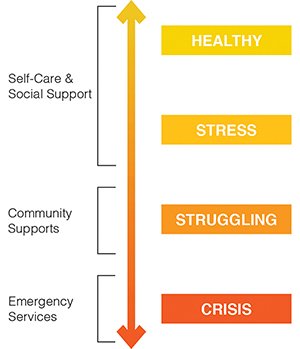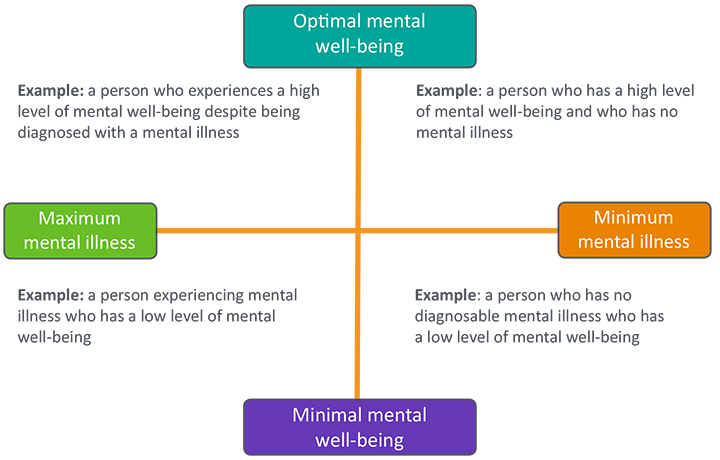At the Halton District School Board, there is a Circle of Support for every student. The Circle of Support begins with the student, parent/caregiver and educator. For every student, educators and other staff provide relationships, classroom environments and classroom instruction that promotes mental health and well-being. As a student's need increases, the circle is broadened and additional resources and supports are added.
At school, speak to your child’s teacher or other trusted staff person. Your teacher, other school staff and child and youth counsellors and social workers are available to help.
- Video Series - Mental Health & Well-Being
We work together with students, parents/caregivers, teachers, administrators, other Board staff and community agencies to promote and support students’ mental health and well-being. We have Child and Youth Counsellors, Mental Health Psychologists and Social Workers.
Here is information about the services they provide, and how you can ask for help.
School-Based Child and Youth Counsellors (CYCs - K-8 & Gary Allan)
CYCs help students to feel well and have a positive school experience. They affirm each student’s identity and focus on the promotion of well-being. In classrooms or small groups, CYCs provide learning and discussion on well-being and solving problems. In some instances, CYCs support students individually, guided by the student’s goals which are shared with parents/guardians.
School-Based CYC referrals are made through school teams only. To learn more or to request the help of a CYC, students and parents/caregivers can ask their teacher or principal. Parent/caregiver consent is required for CYC support.
Social Workers (Kindergarten - Grade 8)
Social workers work together with parents/caregivers, school staff, students and community providers so that students can feel well and have a positive school experience. Together a plan to support the student is developed. Social workers can help provide referrals to community organizations.
To learn more or to request the help of a social worker, parents/caregivers can ask their child’s teacher or principal. Parent/caregiver consent is required for students in these grades.
Social Workers (Grades 9-12)
Social workers work together with parents/caregivers, school staff, students and community providers so that students can feel well and have a positive school experience. Together a plan to support the student is developed. Social workers can help provide referrals to community organizations.
Student's in Grades 9-12 can self-refer for social work support, select from the list below.
Social Workers - Select Your School
In the community for counselling:
-
Alcoholics Anonymous 24 hour Helpline Halton: 905-845-5900 Alcoholics Anonymous is a fellowship of people who come together to solve their drinking problem. It doesn’t cost anything to attend A.A. meetings. There are no age or education requirements to participate. Membership is open to anyone who wants to do something about their drinking problem. The website also lists upcoming meetings.
-
OneStopTalk A free, immediate and confidential service for children, youth and their families. Click the "Start the Conversation" button or call 1 855 416 8255. Service is provided in Monday-Friday 12-8pm and Saturdays 12-4pm. When you reach out you can instantly connect with a registered therapist by phone or video. Together, they'll help create a plan to help you feel better.
-
Reach Out Centre for Kids Live Answer 289-266-0036; Virtual Walk-In ; Live Chat Can you add: Currently there are therapists who speak Bulgarian, Ukrainian, Russian, Mandarin, Yoruba, Spanish and French. We also have partnerships with Roots Community Services and Enaahtig Healing Lodge.
-
-
-
-
- Indus Community Services: 905- 275-2369
-
-
SAVIS Tel: (905)825-3622, e-mail:
savis@savisofhalton.org Support for violence or sexual violence in intimate relationships, including trafficking
-
ADAPT Halton for youth wanting information or help to manage drug, alcohol or gambling concerns
-
Sioutreach.org: Iinformation and coping strategies for self-harm/self-injury
-
Radius Child & Youth Services specializes in working with children, youth, and families who have experienced sexual, physical, or emotional abuse, neglect, or witnessed intimate partner violence.
-
-
Naseeha - Muslin Youth Helpline (1-866-627-3342)
-
-
-
-
-
-
South Asian Youth -
Support for South Asian Community - SACHSS offers culturally and linguistically appropriate services for the South Asian community. SACHSS Distress Helpline - If you are distressed or feeling low or depressed or under any kind of stress or just need someone to talk to please call SACHS Distress Helpline 289-277-4770, 437-254-2794, 647-523-6380 or 416-863-0511
-
-
-
For crisis support







